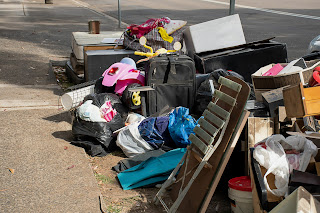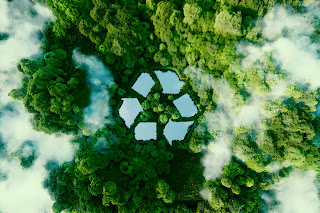New ideas and the Effects of Recycling Plastic Waste
Plastic waste has become a global environmental concern due to its persistence in the environment and detrimental effects on ecosystems and human health. In response to this crisis, innovative approaches to recycling plastic waste have emerged, aiming to mitigate its environmental impact and promote a circular economy.
This article explores some of these new ideas and examines their effects on plastic waste recycling efforts.
1)Advanced Recycling Technologies:
Advanced recycling technologies offer promising solutions
for handling plastic waste that traditional recycling methods cannot
effectively process. These technologies encompass a range of processes,
including chemical recycling, pyrolysis, and depolymerization, which break down
plastic waste into its molecular components for reuse.
Chemical recycling involves converting plastic waste back
into monomers or other valuable chemicals through processes such as
depolymerization or dissolution for plastic
waste recycling in Dubai. These monomers can then be used to produce
new plastics or other materials, closing the loop and reducing the demand for
virgin resources.
Pyrolysis is another innovative approach that uses high
temperatures to break down plastic waste into liquid fuels, gases, and char.
These products can serve as feedstocks for various industrial applications,
including energy production and chemical manufacturing, offering an alternative
to fossil fuels and reducing greenhouse gas emissions.
Additionally, depolymerization technologies use catalysts
or enzymes to break down polymers into simpler molecules, which can be used as
raw materials for producing new plastics or other materials. These processes
have the potential to transform plastic waste into valuable resources while
minimizing environmental impact.
2)Biodegradable and Compostable Plastics:
Biodegradable and compostable plastics offer a more
sustainable alternative to conventional plastics, as they are designed to break
down into natural compounds under specific environmental conditions. These
plastics can help reduce plastic pollution in landfills and oceans, as well as
decrease reliance on fossil fuels.
Biodegradable plastics degrade through biological
processes, such as microbial action, into carbon dioxide, water, and biomass by
electronic waste
collection Dubai. They are often derived from renewable resources such
as plant-based polymers or biodegradable synthetic polymers, offering an
eco-friendlier option for packaging and single-use products.
Compostable plastics, on the other hand, undergo controlled
degradation under composting conditions, resulting in the production of compost
or humus. These plastics are typically certified according to recognized
standards, ensuring their compatibility with industrial composting facilities
and home composting systems.
While biodegradable and compostable plastics hold promise
for reducing plastic pollution, challenges remain regarding their proper
disposal and end-of-life management. Ensuring adequate infrastructure for
composting and educating consumers about proper disposal practices are
essential for maximizing the environmental benefits of these materials.
3)Upcycling and Repurposing:
Upcycling and repurposing involve transforming plastic
waste into new products with higher value and functionality, diverting it from
landfills and incinerators. These creative approaches not only reduce waste but
also promote resource conservation and environmental sustainability.
Upcycling initiatives utilize discarded plastic materials
to create innovative and aesthetically pleasing products, such as furniture,
fashion accessories, and home decor. By giving new life to old plastics, these
projects demonstrate the potential for turning waste into valuable resources
while fostering creativity and awareness about recycling with trash waste management in Dubai.
Repurposing involves using plastic waste in unconventional
ways to meet specific needs or solve problems in local communities. For
example, plastic bottles can be repurposed as building materials for
constructing low-cost housing or as containers for vertical gardens in urban
areas. These grassroots initiatives empower communities to address plastic
pollution while improving living conditions and promoting sustainable
practices.
4)Consumer Engagement and Education:
Consumer engagement and education play a crucial role in
promoting plastic waste recycling and fostering behavior change towards more
sustainable consumption habits. By raising awareness about the environmental
impact of plastic pollution and the importance of recycling, individuals can
make informed choices and take action to reduce their plastic footprint.
Educational campaigns and outreach initiatives provide
information about recycling programs, proper waste management practices, and
alternatives to single-use plastics. These efforts empower consumers to make
environmentally conscious decisions, such as reducing plastic consumption,
choosing reusable alternatives, and recycling plastic waste whenever possible.
Furthermore, incentivizing recycling through rewards
programs, deposit-return schemes, or tax incentives can encourage participation
and improve recycling rates of electronic
waste management in Dubai. By aligning economic incentives with
environmental objectives, policymakers and businesses can promote a culture of
recycling and incentivize sustainable behaviors among consumers.
Conclusion:
In conclusion, new ideas and innovations in plastic waste
recycling offer promising solutions for addressing the global plastic pollution
crisis and advancing towards a more sustainable future. Advanced recycling
technologies, biodegradable and compostable plastics, upcycling and repurposing
initiatives, and consumer engagement and education efforts all play critical
roles in promoting plastic waste recycling and reducing environmental impact.
By embracing these innovative approaches and working
collaboratively across sectors, we can create a more circular economy where
plastic waste is minimized, resources are conserved, and ecosystems are
protected for future generations. Through collective action and commitment to
sustainable practices, we can turn the tide on plastic pollution and build a
healthier, more resilient planet for garbage
waste disposal Dubai.



Comments
Post a Comment